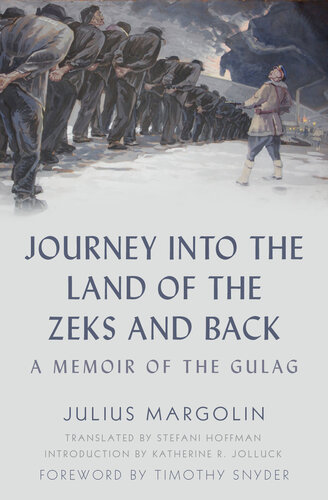
Journey into the Land of the Zeks and Back
A Memoir of the Gulag
کتاب های مرتبط
- اطلاعات
- نقد و بررسی
- دیدگاه کاربران
نقد و بررسی

Starred review from August 15, 2020
The first English translation of the author's gulag memoir, composed in Russian in 1947 and first published in France in 1949. Published long before Alexander Solzhenitsyn's Gulag Archipelago (1973), Margolin's fierce expos� was largely ignored after the war. In this new version--featuring maps and glossary, a foreword by Timothy Snyder, and a helpfully contextual introduction by Katherine R. Jolluck, translator Hoffman does a brilliant job rendering Margolin's sardonic flourishes in his presentation of the senseless cruelty of the Soviet gulag system. Born in Pinsk in 1900, then in Russia's tumultuous Pale of Settlement, Margolin--a Jew who was trying to return to Palestine, where his family had moved by the time of the invasion of Poland in 1939--was ultimately caught up in the terrible nationalistic dilemma of accepting a Soviet passport or returning to Nazi-occupied Poland. Ironically, those who did return perished in the concentration camps. Margolin was arrested and endured five years in the Soviet prison system. He was taken by "coffin" train to the far northwest, on the northern tip of Lake Onega, where Stalin had established a camp to provide the labor to construct the Baltic-White Sea Canal. With the Nazi invasion, the inmates were moved by foot, walking 12 hours per day to the Kargopol camp, 300 miles east. Via the meticulous day-to-day chronicling of the horrendous conditions and labor, spiritless terrain, meager rations, foul conditions, and sadistic behavior by the hardened, predatory criminals with whom he traveled and worked, Margolin sketches the thoroughly dehumanizing system of Sovietization. "I was never enchanted by the Soviet regime," he writes, "and I never doubted that its theory was unsustainable and its practice full of cruel human fraud." Attempting to reveal the truth about the camps, Margolin was met by "a stone wall of indifference and treachery." The final section, "Road to the West," delineates his arduous, miraculous return to freedom. Beautifully written, incredibly detailed and moving--an important historical document.
COPYRIGHT(2020) Kirkus Reviews, ALL RIGHTS RESERVED.

























دیدگاه کاربران